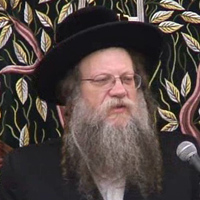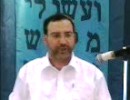998
As soon as he entered the synagogue where the class was to be held, he noticed two men arguing amongst themselves as to whether one should eat meat or dairy dishes on the night of Shavuot. The argument had already turned into a personal affair between the two of them, accompanied by raised voices and heated claims thrown one against the other.
The fiery row paused as soon as they heard the sound of Rabbi Eliyahu’s car approaching, and they thought to themselves to ask Rabbi Eliyahu’s opinion on the matter as soon as he entered the synagogue. The Rav entered and began the class, and without any connection to the subject of the class, one of the antagonists asked what should be eaten at the meal on the night of Shavuot - meat or dairy. His partner in the argument interrupted his speech and said his say, and it was clear that there were here two antagonists that were only staying calm out of respect for the Rav.
The Rav listened to their question with all seriousness and answered that there was a difference of opinion on the subject amongst the rabbis. On the one side there is value in eating meat, as it shows respect for the festival, and it’s written that there is no joy without meat and wine. And from the other side, there is value in eating dairy foods, as a remembrance of the two breads from the Temple and other reasons.
The two sides refused to give in and each was determined to prove they were right. They asked, "What does the Rav eat on the night on Shavuot?"
Indeed, we were all curious to know how the Rav would get out of the trap that was laid before him. With a smiling face, he answered, "What my wife cooks, I eat!"

5. Weddings and Engagements during the Omer Period
Chapter 3: Customs of Mourning during the Omer Period
Rabbi Eliezer Melamed | Tishrei 30 5782

Shehecheyanu, Clothes, and Renovations During Sefira
Rabbi Daniel Mann

Shehecheyanu, Clothes, and Renovations During Sefira
Rabbi Daniel Mann

5. Weddings and Engagements during the Omer Period
Chapter 3: Customs of Mourning during the Omer Period
Rabbi Eliezer Melamed | Tishrei 30 5782

Tolerance but Not at All Costs
Ayn Aya Shabbat v, 73
Rabbi Ari Shvat | Iyar 5785

Reassuring His Parents – #314 – part I
Date and Place: 23 Sivan 5670 (1910), Yafo
Beit Din Eretz Hemda - Gazit | Iyar 5785

Daf Yomi Makkot Daf 20
R' Eli Stefansky | 30 Nisan 5785






